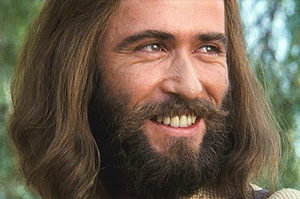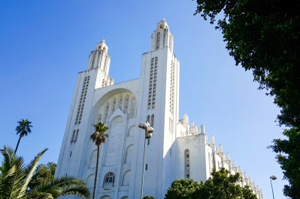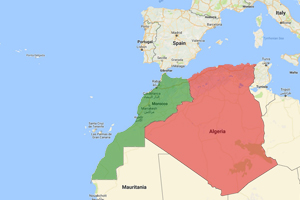
Jesus in the Quran
JESUS in the Quran JESUS IN THE KORAN AND INTER-RELIGIOUS DIALOGUE After much reflection, I have decided, for the first editorial of this blog, part

“A people without memory is a people without a future” wrote Aimé César or “He who does not know where he comes from cannot know where he is going” said Antonio Gramsci. For millions of Moroccans, the Toumliline Monastery is simply a historical non-place…
In Morocco, history has left us very little trace of anything related to Christianity or Judaism (2500 years of Jewish presence in Morocco). But, as there are exceptions in everything, it so happens that in the case of the Toumliline Monastery, amazed witnesses wanted to pass on to their contemporaries facts that they had experienced or heard about.
Since the reign of Mohammed VI, Morocco has created the Royal Institute for Research on the History of Morocco in 2006 and the Foundation Memories for the Future (FMA) in 2008 to promote research on national history. Then, the institution Archives du Maroc was created in 2007 and established as a strategic public establishment in 2012. These three institutions were, in a way, the first milestones of research and dissemination work, even if still very limited, on the memory of the Toumliline Monastery, which still vibrates in the depths of those who knew it or lived there.
Then, there were two majestic books that contributed to reconstitute the essence of the life of this monastery and give substance to this precious heritage that is unique in contemporary history… These are the books by François Martinet* and Jamaâ Baida*.
There was also a documentary film “The Bells of Toumliline” which, according to its Moroccan director Hamid Derrouich, is a first attempt to bring certain places of national memory out of a devastating oblivion.
An aspiration has been born, it is salutary, it indicates the path to take, the way to follow to give birth to a new generation free of clichés and stereotypes that have been lingering for a long time in various forms of thought preventing Moroccan citizens from blossoming and fully exploiting the great wealth of their cultural, theological and historical heritage.
A very interesting project, led by the FMA, is in the process of being developed, which will carry the values that have been the source of human virtues in recent times. The leaders and partners of this federation are trying to define a new concept for “Reinventing Toumliline”. But the birth of this project is struggling to materialise…
Now that the seeds have been partially sown, what should be done to ensure that the memory of this “exceptional decade” is properly transmitted? Should we recreate the same spirit in the right line of the Toumliline heritage and call again on Benedictine monks to awaken, restore and amplify this exceptional heritage?
In a country where the Islamist wave has insinuated itself into all aspects of social life and tends to impose a new social norm. In a country where, unfortunately, since the 1970s, we have been observing increasingly worrying drifts that threaten everything our ancestors built, everything we are legitimately proud of, everything we are accustomed to calling ‘civilisation’. The submerged part of this “Freudian” or Salafist Islamism of the Wahhabist movement is well anchored within the Moroccan population. In such a context, talking about a new monastery like Toumliline may seem simply very foggy to rational minds.
However, with intelligence, energy and a dose of wisdom, we can accomplish feats, we can recreate our own house of prayer in the image of the Toumliline monastery. Islam has not been very explicit from its origins, to Christian monks, verse 27 of Sura 57:
« and We have placed in the hearts of those who followed him (Jesus, son of Mary), the seeds of gentleness, compassion and monastic life. »
verse 27 of Sura 57 Tweet
Islam has not seen similar vocations flourish in its midst, especially among Sufis.
For a house of song, prayer and peace is very familiar to us as a monastery. In Morocco, this culture of song and prayer is very present mainly in the Zaouias or in private circles.
“If Islam is a body, Sufism is its heart”, writes Sheikh Khaled Bentounès in “Sufism, the Heart of Islam” *(1). Commonly called Muslim mysticism, Sufism is the very heart of Islam. It alone gives meaning to religion by revealing how Islam, far from an alienating “submission”, raises man to the greatest proximity to the divine while inscribing him in a universal brotherhood.
Faouzi Skali*(2), an unclassifiable man, a great scholar and the very soul of Moroccan Sufism in our time, is himself in this lineage of the great Sufi mystics “… This interaction between the personal and the collective allows for the production of a living culture, which changes with time and place, but whose ultimate goal is to be the expression of universal spiritual values. “The teachings, chants, art or literature of Sufism (…) refer to the need to go beyond the limits of our personal or communal egocentrism, in order to access the ultimate and universal meaning of love, knowledge or compassion.
According to Aziza Bennani*(3), the message of love in the great mystic Ibn Arabi is part of this doctrine of the “Oneness of Being”. Love resides in the union of divine transcendence with creation, the corollary of which is human nature. This is what Ibn Arabi says in Al Foutouhat al Maqquiyas:
“O wonder, a garden among the flames/My heart becomes capable of any image/It is a meadow for gazelles/Convent for monks/Temple for idols/Mecca for pilgrims/Tablets of the Torah and book of the Qur’an/I am the religion of love/Anywhere its mounts go/Love is my religion and my faith.”
For Ibn Arabi, the movement that gives rise to the existence of the universe is the movement of love and the spiritual path is essentially a path of love:
For Mohammad Djalâl ud-Dîn Balkhi, known as Rûmi *(4), one of the most illustrious mystical thinkers of the Sufi tradition of all times, everything is love. According to him, the universalism of love and humanism has several facets, principally love of neighbour, which can be translated into an open-mindedness that is indispensable for accepting and welcoming the other when he is different.
Advocating human qualities, manifestations of love for the other, of this openness of heart to the other, he exhorts us to see God in the other beings of creation, for all are creatures of God; this is why, when we love someone, it is in reality God that we love. Rûmi thus shows a great openness of mind for his time, by clearly displaying his solidarity with other religions, and by affirming that only the paths differ, but that all pursue one and the same goal, namely the search for God and proximity to God. According to him, the various religions are in fact only different ways of accessing God.
This brief presentation of Sufism should encourage us to combine our efforts to recover these monastic messages of love, brotherhood, uniqueness of existence, spiritual universalism, openness, and peace so that the spirit born in Toumliline blows again and regains its radiance, its greatness, its generosity, and its inventiveness, so that it can dazzle the whole of humanity once more.
Now, a place must be chosen, a Moroccan city with great intellectual, cultural and spiritual experience, a city with a long history of religious diversity, of serene coexistence and concord between different human communities, strongly imbued with the universal principles and ideals advocated by divine prescriptions and human civilisations, a city with a heritage of living intangible wealth, nourished and invested with the spiritual culture of Sufism.
This city can only be the spiritual and cultural capital of Morocco, one of the major centres of Islamic civilisation, renowned for its great medina, classified as a UNESCO World Heritage Site and home to the oldest university in the world, Al Quaraouiyine, which dates from 859.
The city of Fez has the most important Sufi festival on a continental level. Since its creation, this festival has contributed to the dialogue of cultures and religions by stimulating and enriching an approach based on “moral rectitude”, the purification of the soul, the primacy of love, humility and brotherhood, the acceptance of the “dogmas of existential sharing”, i.e. recognising that the other also holds a part of the divine message and the desire for spiritual emulation in order to reach a state of divine grace.
The city of Fez has its Spirit of Fez Foundation and its Festival of World Sacred Music created in 1994. A festival of dialogue of spiritualities through music, the creation of a culture of peace favoured by a plural globalisation, respectful of the ethical and spiritual values of the city.
The city of Fez has its Amazigh festival which has, over the years, promoted Amazigh culture through the enhancement of the Amazigh intangible heritage, cultural diversity and their contribution to the culture of peace, dialogue, openness to others and living together.
All these festivals and many others are undeniable assets, capable of instilling a new religious approach, a new space of meeting, exchange, confrontation of ideas, fraternity open to the three religions of the Book, to all citizens, to all communities and beyond, to all peoples of the world.
The city of Fez is destined to become an eminent home for several generations of researchers in sociology, anthropology, history and philosophy or in humanities or political sciences, but also of critical thinking to deal with contemporary issues at the level of Morocco, Africa, Asia, Europe, America in the straight line of the “spirit of Toumliline”.
The city of Fez, in this vision, should be the centre of a thought articulated on a universalism and humanism which, by principle, make us know the Other in all his humanity and complexity. The aim of this thought is to reach a model based on “deep understanding”, “cooperation”, “living together” and, beyond that, a world of love and peace allowing the establishment of a true, fertile, stimulating, enriching, constructive and creative dialogue between the three monotheistic religions in the spirit of the God of Abraham, the common God of all believers.
The city of Fez, already well known for its Al Quaraouiyine University, is also renowned for its Euro-Mediterranean University, which is steeped in history and inspired by the cardinal values of Fez in terms of openness, an unquenchable thirst for learning, for knowing and understanding each other in depth, and for loving each other in diversity in order to build a regional platform for cooperation. This university has all the assets to become an important centre of influence in the field of religious studies, but also of critical thinking. We propose the creation, within this university, of an institute for the study of the three monotheistic religions, mainly intended to lay the intellectual and spiritual foundations of openness to the Other and thus participate in the creation of a new human city where the permanent values of each religion would have their place.
To conclude, I cannot pass over in silence these beautiful words of Mr. André Azoulay, a respected man. André Azoulay, a man respected, esteemed and much appreciated by all Moroccans, a great militant for peace and inter-religious coexistence, a refined and cultured man who has become part of the national landscape in a golden character to make Essaouira and Morocco shine throughout the world*(5) :
«... Toumliline for Moroccans of my generation is the most emblematic space of what our society can dream of maintaining in activity and in life. It is also the space that should inspire even more strongly and in a well-structured and organised way, everyone in civil society. (...) Toumliline has not been circumstantial for a given moment. In these times when all the archaisms and regressions are around us, at our doorstep, the spirit of Toumliline can serve as a source of inspiration. »
André Azoulay Tweet
Mr André Azoulay told Hespress FR a wonderful story which basically confirms the unity of the three religions which essentially combine monotheism and universalism without any doubt by the grace of Abraham, the common Father of believers, man of prayer and peace. Mr Azoulay said that during a stay in Essaouira of the great Tunisian writer, Abdelwahab Meddeb, may God be with his soul, the latter had made him discover the depth of the relationship between Muslim and Jewish Sufism. “He particularly enlightened me on the capillarity between the schools of the Kabbalah (an esoteric tradition of Judaism, editor’s note) of Essaouira and the Zaouia and the very rich exchanges that took place between them. He was himself deeply imbued with it”, he said. “… For my part, I have always been inspired by this Sufi thought which has allowed me to go towards all challenges and to have the conviction and resilience that everything is possible. (…).
Indeed, Islam, which cemented this multiple and complex country, integrated local beliefs and specificities to make an open, uncomplicated Moroccan Islam…, of which Sufism is one of the manifestations of its national genius, its DNA. The sanctuaries of Muslim marabouts adjoined the tombs of Jewish saints, and sometimes merged.
The mystical currents of the Benedictine monks and the Muslim Sufis thus joined this mystical current of synagogal Judaism*(6). An exceptional destiny, isn’t it?
If mysticism is the place where Jews, Christians and Muslims can converge and find points of agreement that can help illuminate what is true and holy in each religion, then we could all, in our different religious traditions, build a human city based on permanent values (of light) in each religion and seek in this faith of light the outline of a confraternity where human beings can exchange on their way of living in peace, of sharing, of coexisting and of enriching one another.
Jalal Boubker Bennani
“Sufism, the heart of Islam” by Sheikh Khaled Bentounes, published by Albin Michel. Sheikh Khalid Bentounes is the spiritual guide of the Alawiyya Sufi brotherhood.
Faouzi Skali, university professor, anthropologist, writer (author of some fifteen books), specialist in Sufism. Doctor of State in anthropology, ethnology and religious sciences, Paris VII. Co-founder of the Fez Festival of World Sacred Music, also initiator and president of the Fez Festival of Sufi Culture…
“850th anniversary of his birth, The universal legacy of Ibn Arabi” by Aziza Bennani, the Economist of 12/08/2014. The great Sufi mystic, theologian, metaphysician, thinker, philosopher and poet, Mouhyeddine Mohamed Ibn Arabi, born in Murcia, Spain (1165/1240) is considered one of the greatest spiritual masters of all time. The Aurific work (846 works) is studied and commented on in prestigious universities and research centres throughout the world.
Rûmî is one of the most eminent mystical thinkers of the Sufi tradition of the 13th century and of all times, and one of the most illustrious humanists, philosophers and theologians not only of Iran, but of the entire Islamic world, and indeed of all humanity.
Advisor to His Majesty the King, President-Founder of the Essaouira-Mogador Association, President of the Anna Lind Euro-Mediterranean Foundation for the Dialogue between Cultures, President of the Foundation of the Three Cultures and the Three Religions, based in Seville, member of the United Nations High Level Group for the Alliance of Civilizations.
Judaism has developed from its beginnings a powerful and original mystical current whose influence has been considerable throughout history. Its currents, well before those of the monks and Sufis, are diverse: the Kabbalah, the Zohar, Hasidism, Sabbataism, Merkaba, Gnosis.

JESUS in the Quran JESUS IN THE KORAN AND INTER-RELIGIOUS DIALOGUE After much reflection, I have decided, for the first editorial of this blog, part

Christianity in Morocco A BRIEF HISTORICAL OVERVIEW OF CHRISTIANS IN MOROCCO We are going to fly over a few periods of the very ancient and

In the meantime, what could we hope for Algeria? Without doubt that Algeria knows the happiness of an alternation Moroccan style…. SO THAT OUR PEOPLES

The first « think tank » unique in the world: an interfaith Woodstock THE MONASTERY OF TOUMLILINE In a world in “perpetual” distress, desolation, drift,

REINVENTING TOUMLILINE “A people without memory is a people without a future” wrote Aimé César or “He who does not know where he comes from